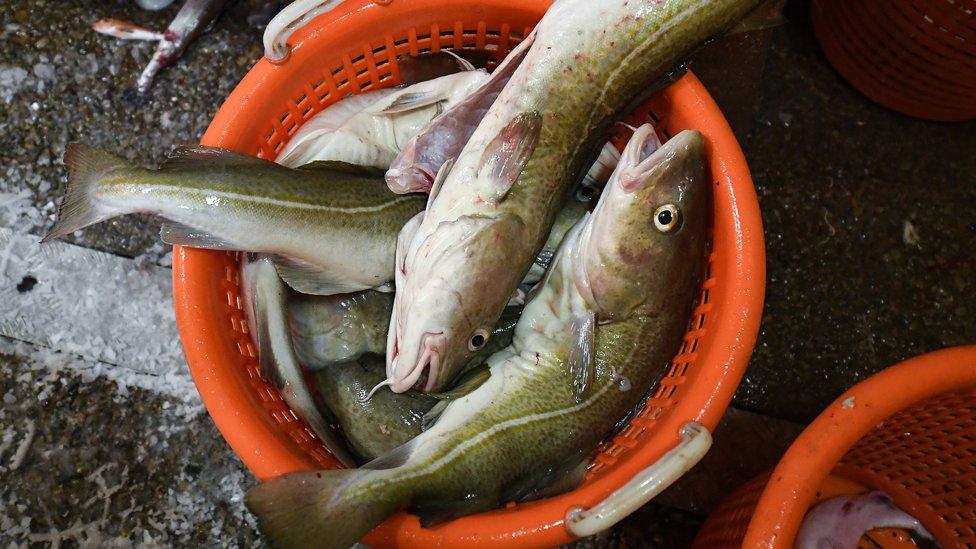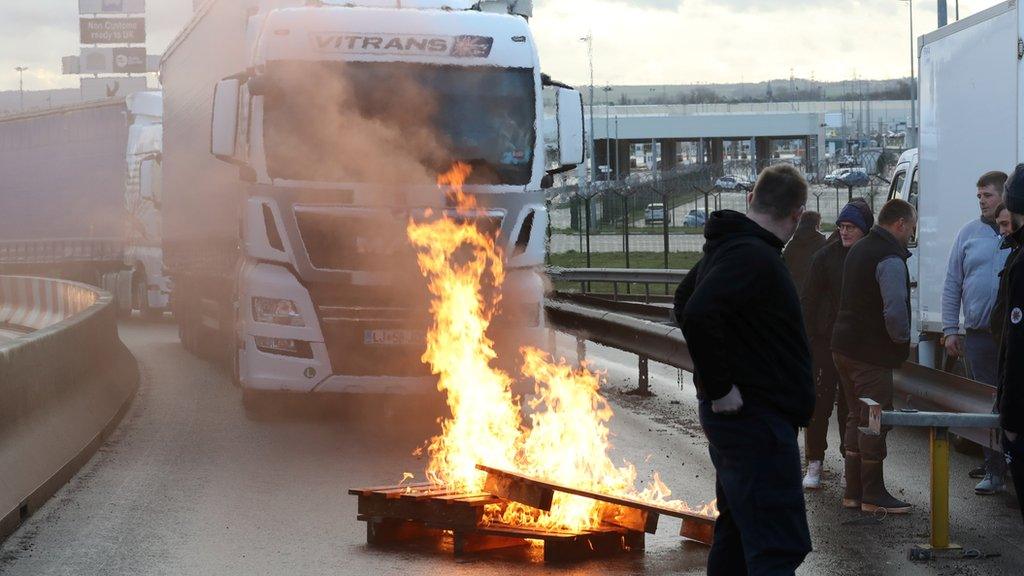UK boat detained by France amid fishing rights row
- Published

The Cornelis Gert Jan, which is owned by MacDuff Shellfish of Scotland, was detained when fishing in French waters
A British trawler has been seized by France and another has been fined, amid an escalating row over post-Brexit fishing rights.
French maritime minister Annick Girardin said the ships were cautioned during checks off Le Havre overnight.
She said the first did not comply right away and the second was not allowed to fish in French waters so was detained.
No 10 said it was watching events closely and wanted France and EU talks but was ready to respond appropriately.
Earlier, the environment secretary said he was "urgently" investigating the situation in relation to the detained vessel - which has been named as the Cornelis Gert Jan.
Responding to an Urgent Commons Question from the SNP, George Eustice said the boat was on a list provided by the Marine Management Organisation (MMO) initially provided to the European Union.
He insisted the European Union did grant a licence to the vessel but it was "unclear" why, according to reports, it was subsequently withdrawn from the list.
Mr Eustice said he was awaiting further details from Marine Scotland and was expecting a response in the "next hour or so".
Deidre Brock, the SNP's environment spokesperson, said it was not good enough that the environment secretary had so little information.
MacDuff Shellfish of Scotland, which owns the Cornelis, said the crew of its vessel were "in good spirits" after it was "ordered into a French port while legally fishing for scallop in French waters".
The captain was questioned after leaving the boat with French authorities and being given legal representation by the company.
MacDuff Shellfish confirmed the captain had been released and returned to the ship, but the Cornelius was "not at liberty to leave" the port while the investigation was ongoing.
The firm's Andrew Brown said the crew would remain on board until its release.
He said Macduff's "fishing activity [was] entirely legal" and it appeared the Cornelis, based at Shoreham, in West Sussex, had been "caught up" in the ongoing UK-France post-Brexit fishing row.
Watch: British trawler Cornelis Gert Jan is held in Le Havre.
Mr Brown warned that without "a speedy resolution", the vessel's catch could be confiscated by the French authorities, and called on the UK government to "defend the rights of the UK fishing fleet".
The firm would "vigorously defend" itself against any claims, but its "priority concern" was for the welfare of the vessel's crew, he said.
Ms Girardin had said on Twitter, external the trawler was found to be fishing in the Bay of Seine without the proper licences.
The minister said checks on the British vessels were standard during the scallop fishing season.
But she added they had also been undertaken against "the backdrop of the tightening of controls in the Channel, in the context of discussions on licenses with the United Kingdom and the European Commission".

A shot across the bows

In naval parlance, this is called a shot across the bows.
Technically, the French checks on UK trawlers in the Channel overnight do not form part of the raft of retaliatory measures announced in the fishing row.
But there should be no doubt they are intended as a message about what is to come.
From Tuesday, British and Channel Islands fishing boats will not be allowed to offload their catch at French ports.
But that is the least of it. Only 5% of UK seafood exports to France arrive in this way. The rest comes by freight.
Potentially far more disruptive will be intensified controls at Calais and other entry points for UK trade by ferry and tunnel.
The French authorities will be conducting what they call a "grève de zèle" - in other words becoming suddenly punctilious, thorough and on the look out for infractions.
And it is not just fish imports which will be checked, but everything.
The aim will be to create long tail-backs which will play on the news channels - reminding UK viewers of the costs of go-it-alone.

France had warned it would block British boats from some ports next week - as well as tightening checks on UK boats and trucks - if a post-Brexit dispute over fishing licences was not resolved by 2 November.
On Wednesday evening, it issued its ultimatum, saying it would begin to impose "targeted measures" from next Tuesday, including preventing British fishing boats from disembarking at ports and more checks on UK goods.
France has also warned it could cut electricity supplies to Jersey, a British Crown dependency, as it previously threatened in May.
Mr Eustice said threats of sanctions made by France were "disappointing and disproportionate" and appeared to breach the post-Brexit deal and international law.
He appealed to MPs to "remain calm", saying the UK would not get into a "retaliatory tit-for-tat" but warned of a possible "appropriate and calibrated response" if France carried out its threats.
George Eustice says France's response has been "disappointing and disproportionate"
Mr Eustice rejected French claims that the process for applying for fishing licences had been slow and difficult, saying officials had granted 98% of post-Brexit licence applications from European boats to fish in UK waters.
He said more were expected to be granted following "constructive" talks with the European Commission and that he had told the French and the Commission that the UK's "door remains ever open".
French politician and member of President Macron's En Marche party, Bruno Bonnell, told BBC Radio 4's World at One programme that French fishermen were "losing 25% of their business because of regulation".
He said "in the Brexit treaty we were not supposed to reach this point of tension" and disagreed with the licensing figures quoted by Mr Eustice, saying 200 licences had been granted.
Mr Bonnell argued French authorities "have ways to retaliate if you push too hard" and he "would not be surprised if by next week we see significant advances" in discussions.
The UK maintains the rejected applications which sparked the row did not have enough supporting evidence to show they had a history of fishing in Britain's or Jersey's waters.
A meeting with officials from France, Jersey, the UK and European Commission on Wednesday led to 162 French boats being given licences to fish in Jersey's waters from Friday.
The government of Jersey said it was "extremely disappointed" by the latest threats of sanctions by France. French trawlers previously protested outside the port of St Helier on the island.
Labour's shadow environment secretary Luke Pollard said the tensions were a result of the government losing control of negotiations and there was real concern "the botched Brexit deal" was going to lead to more clashes.

THE INSPIRATION BEHIND ALL MY LOVING: A unique insight into the life and art of Paul McCartney
A SIMPLE WAY TO IMPROVE YOUR HEALTH: The benefits of drinking water with every meal

Related topics
- Published28 October 2021

- Published29 September 2021

- Published1 January 2021

- Published23 December 2021
